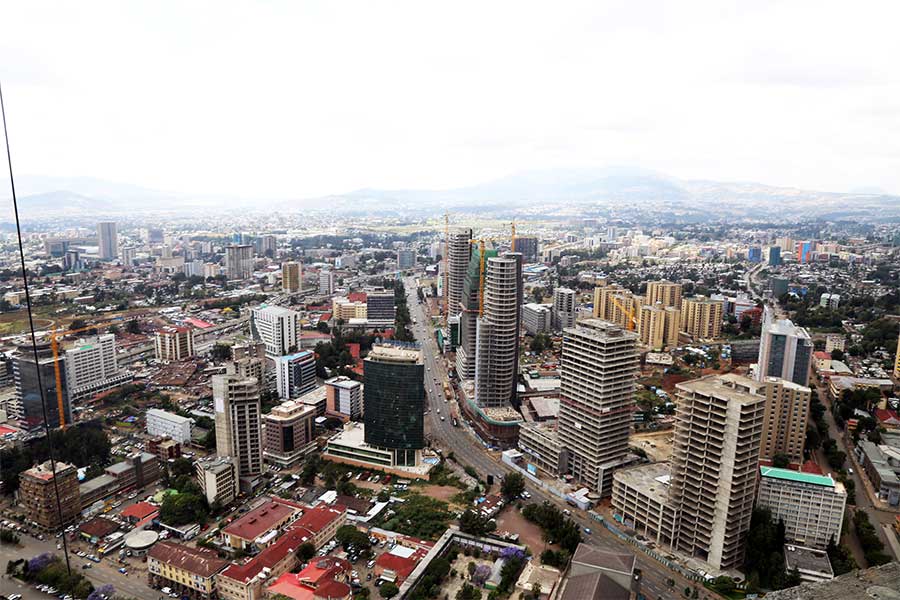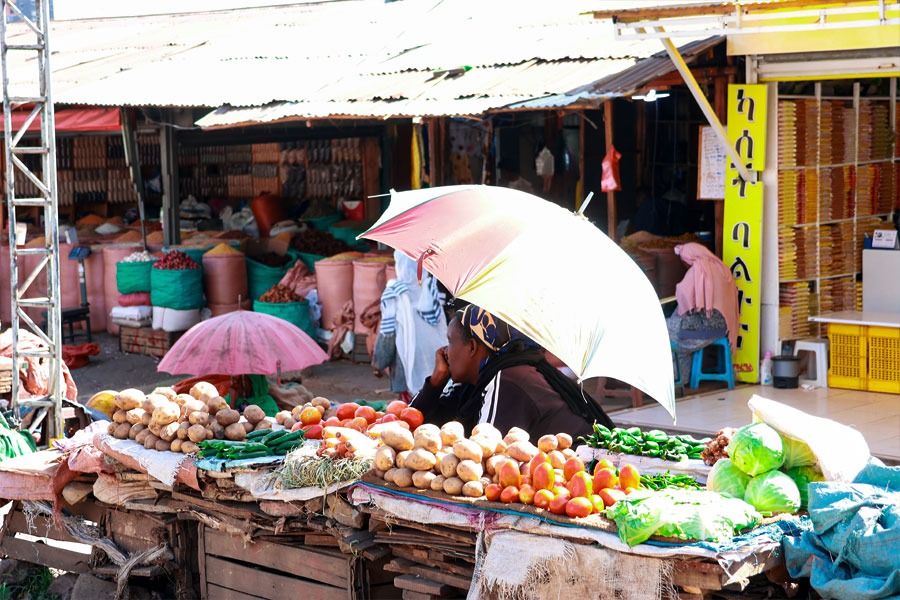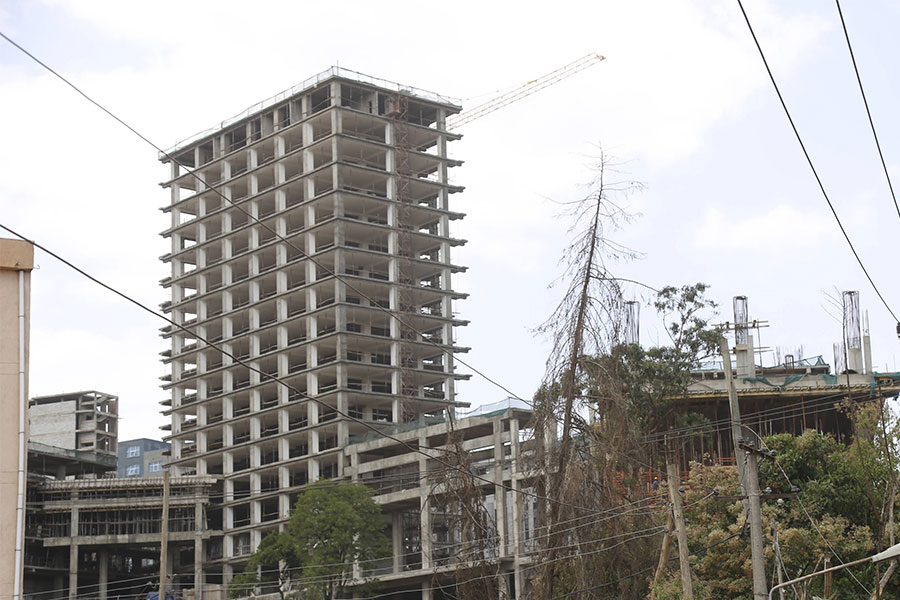
Fortune News | Jul 06,2019
Around the middle of the business day on Wednesday, December 18, 2019, Merkato, the largest open market in the capital city, was very busy with the usual hustle and bustle. Ehil Berenda, literally translated as "cereal crops floor," was one of the busiest spots where daily labourers were unloading agricultural goods from trucks. At the same time, street vendors were selling food items to customers intent on stocking their kitchens.Biaaba Temam, in his early 30s, was among the crowd looking to buy teffin Ehil Berenda.
Biaaba, a father of two, buys 50Kg of red teffevery two months to feed his family.
Teffis one of the primary foods in Ethiopia. The traditionally grown cereal crop is milled before it is fermented and then baked on large circular clay griddles to make a grey flatbread called injera.
Born in Jimma town, Oromia Regional State, and raised in the capital, Biaaba used to spend around 1,575 Br to buy teffthat would last his family for two months, but lately the price of food items is increasing and becoming hard to afford for many.
“From my experience, this is usually a time when food items decrease in price, because harvested crops start entering the market [during Meher],” Biaaba, said. "But this year the price has shown an increase."
Compared to last month, the price of teffhas increased by close to one Birr a kilogram, according to him.
The current price for a kilogram of red teffis 31.50, while white teffis sold for 35 Br.
Teffis not the only cereal that shows an increase, but wheat, rice, sorghum, maize, barley, bread, beans, peas, vetch, onions, garlic and potato prices are also rising.
This is happening even though the government has announced that it is rolling out serious reforms to cure the macroeconomic imbalances, including rising inflation rates.
However, the rate has been steadily increasing for the past five months and has reached the highest in five years.
Usually, November and December are the months where the supply of food items increases, which normally drags the inflation rate down.
The nation has 71.4 million farmers who cultivate 13 million hectares of land, and last year agricultural production yielded 306 million quintals of grain and crops. Agriculture comprises 35pc of the nation's GDP.
However, data from the Central Statistical Agency shows that both the inflation rate of food and non-food items has flown high. November saw higher inflationary pressure with a 20.8pc headline inflation rate. Food inflation reached 24.5pc, scoring a 1.3 percentage point increase.
Boutique shops that sell imported clothing, including this one in Gotera, are feeling the effects of inflation.
Alemtsehay Kidane, who is in her 70s, has been retailing grain and vegetables for the last three decades. She obtains her supplies from wholesalers who get it straight from the farmers.
A mother of seven children, Alemtsehay worries alongside Biaaba about the price escalation of some agricultural products.
“This is the time the Meherharvest enters the market," she says, adding that the untimely rain affected the farmers' products, and the volume of supply was not as much as before. “When we received the crops from wholesalers, the price had increased at least by half a Birr a kilogram."
The prices of major cereals, including teff, wheat, rice, sorghum, maize and barley has shown an increase, according to Alemayehu Teferi, director of household studies & cost statistics at the Agency.
Five years ago in November, the food inflation rate was 4.8pc, while non-food inflation stood at 7.2pc. Since then the inflation rate has climbed five times higher for food items and twice that for non-food items.
"The rate started climbing since November 2018," Alemayehu told Fortune. "Due to the unchanging income of society, people are not affording some goods and services."
The non-food inflation rate has also registered the highest swell with a three-percentage-point rise at 16.4pc pushed up by the rising price of house rent, clothing, footwear, construction materials, firewood, furniture and health care.
Mudin Temam, in his early 30s, opened a boutique three years ago near Stadium, which he says is visited by 15 customers a day. The businessman, who buys a supply of 6,000 Br worth of clothes from Merkato every two weeks, has also noticed the inflation.
He used to get his supplies from a businessperson who imports the products directly from abroad with a relatively fair price. However, six months ago, his supplier stopped providing him with clothes due to the forex crunch.
"Then I started getting my stock from Merkato at a higher price," he said.
Mudin also says that the price of items has significantly increased over the past two months.
"There is an average addition of 50 Br on the products compared to two months before," Mudin told Fortune.
Tadele Ferede (PhD), an associate professor at Addis Abeba University's Economics Department, mentions two reasons for the rising rate of inflation: the supply shortage and the money supply in the economy.
"The agricultural sector’s backwardness leads to supply shortages of food items," Tadele said. "The consequence of this is huge imports to fill the gap, and the forex crunch makes imported goods very expensive."
Tadele also believes that the broad money supply injected into the economy minimises the purchasing power of Birr.
By the end of the last fiscal year, the broad money supply in the economy stood at 886.8 billion Br, a 19.7pc growth from the previous year.
"The government should examine the monetary policy of the country," he said.
Alemayehu Geda (Prof.), a prominent macroeconomist and university lecturer, also links the galloping inflation rate with four factors: low agricultural productivity, the higher money supply in circulation, the depreciation of money and the long supply chain.
"Since the country's food stock has run out," said Alemayehu, "last month's higher inflation rate was expected."
He also says that the rate could remain high this month too, pointing to the latest desert locust attack and the untimely rain.
The Ministry of Agriculture argues that agricultural productivity has increased by 21pc since the 2013/14 fiscal year that yielded 251.5 million quintals of grain. The CSA also forecasts that 380 million quintals of farm products will be harvested this season.
Still, Molla Tegegne, cereal crops care team leader at the Agriculture Ministry, admits that agricultural productivity has issues.
"Untimely rain, crop infestation, traditional farming styles and the dependency on rain cause lower productivity," Molla told Fortune.
To increase agricultural productivity and substitute imports of major food items, the Ministry is testing multiple interventions, according to Molla.
"To substitute wheat imports, the government plans to cultivate 50,000ha of land in the lowlands of Afar and the Somali regional states," Molla said.
During the last fiscal year, Ethiopia spent 11.1 billion Br to procure 1.7 million tonnes of wheat. The imports are on top of the 4.5 million tonnes of grain that was harvested locally in 2017/18.
The Ministry of Finance has been working on a multi-pronged approach to mitigate inflationary pressure both on food and non-food items, according to Eyob Tekalign (PhD), state minister for Finance.
"More specifically, the Ministry, in collaboration with other stakeholders, is leading a team of experts to identify supply-side issues that may have caused the price increase," said Eyob.
The team has forwarded a couple of corrective policy measures to ease the pressure of food inflation. Engaging consumer unions in the distribution of food products by involving Ethiopian Trading Business Corporation and Ethiopian Fruit & Vegetable Marketing S.C. (ETFRUT) to buy food products from the market and sell to consumers at a reasonable price is one of the top concepts being floated.
The team is also reviewing the distribution channels of key commodity items to identify and correct inefficiencies, corruption, and other issues that are limiting these products from reaching the public, according to the state minister.
Allowing private importers to get involved in the import of major food items like oil, sugar and wheat, which has previously been reserved for the state and only a few private companies, is also being adopted. The companies will use their own foreign currency access after it is verified by the NBE.
The City Administration is also working on establishing trading centres at the main gates of the city to enable the farmers to sell their products directly to consumers, excluding the intermediaries..
Alemayehu also forecasts the inflation rate to grow more, since the central bank lifted the 27pc mandatory bill purchase that was imposed on private banks when they disbursed any loan or advance.
"This would potentially aggravate inflation," he told Fortune.
To fill the supply-demand gap, Alemayehu recommends that agricultural productivity should be mechanised and supported by small irrigation systems.
"On top of that, the economic policy of the country should be advised by professionals," he recommends.
The Ministry is very much aware that there needs to be a long-term strategy to improve the marketable surplus of items that either seasonally cause drastic price fluctuations or where the production output is very limited, according to Eyob.
"To address these issues, several strategies have been finalised," he told Fortune. "The completion of irrigation projects is a priority to increase food commodity output, and private sector participation is being aggressively promoted.
Yet Biaaba, who is already frustrated with the price escalation of teff,has decided to mix it with other grains like maize in a certain proportion to minimise expenses.
PUBLISHED ON
Dec 28,2019 [ VOL
20 , NO
1026]

Fortune News | Jul 06,2019

Featured | Jan 11,2020

Viewpoints | Feb 20,2021

Commentaries | Jan 18,2019

Agenda | Dec 09,2023

Sunday with Eden | Apr 06,2019

Fortune News | Feb 15,2020

Agenda | Jul 11,2021

Radar | Dec 11,2021

Commentaries | Jun 18,2022

Dec 22 , 2024 . By TIZITA SHEWAFERAW
Charged with transforming colossal state-owned enterprises into modern and competitiv...

Aug 18 , 2024 . By AKSAH ITALO
Although predictable Yonas Zerihun's job in the ride-hailing service is not immune to...

Jul 28 , 2024 . By TIZITA SHEWAFERAW
Unhabitual, perhaps too many, Samuel Gebreyohannes, 38, used to occasionally enjoy a couple of beers at breakfast. However, he recently swit...

Jul 13 , 2024 . By AKSAH ITALO
Investors who rely on tractors, trucks, and field vehicles for commuting, transporting commodities, and f...

Oct 18 , 2025
The political establishment, notably the ruling party and its top brass, has become p...

Oct 11 , 2025
Ladislas Farago, a roving Associated Press (AP) correspondent, arrived in Ethiopia in...

Oct 4 , 2025
Eyob Tekalegn (PhD) had been in the Governor's chair for only weeks when, on Septembe...

Sep 27 , 2025
Four years into an experiment with “shock therapy” in education, the national moo...